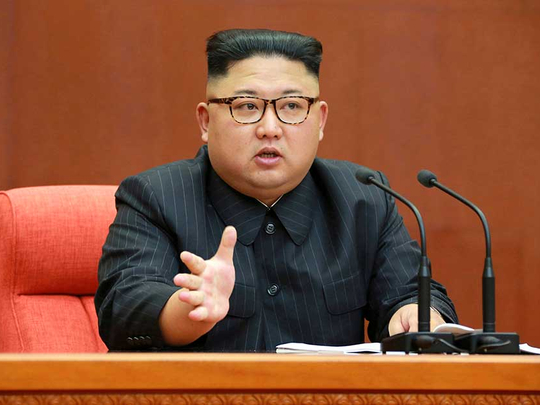
Even in the era of United States President Donald Trump, it’s not every day that you see the chairman of the Senate Foreign Relations Committee publicly accuse a president from his own party of leading the country down “the path to World War III”. The spat between Trump and Senator Bob Corker (Republican, from Tennessee) has thus generated headlines for the window it has opened onto an astonishing rift between the president and one of the most powerful Republicans in Congress.
Yet, the episode may be even more revealing for what it says about the nature of Trump’s strategy for dealing with the world’s most difficult geopolitical challenges — and why that approach may prove far more dangerous than the president realises.
Many of Trump’s core views on foreign policy have remained fairly stable since he emerged as a national figure in the 1980s, and among these is the belief that American leaders need to be crazy like foxes if they are to succeed in a cut-throat world.
Predictability is not a virtue but a vice, Trump has long argued about issues ranging from arms control to trade negotiations; getting the best out of adversaries requires keeping them guessing about the next move. Most notably, Trump has repeatedly threatened military action against North Korea — promising to “totally destroy” the country with “fire and fury like the world has never seen” and arguing that Kim Jong-un understands only the language of force. No matter that this undermines his own diplomats, who have been seeking to lay the groundwork for diplomacy to rein in Pyongyang’s nuclear weapons and missile programmes.
He is ramping up tensions and issuing chilling threats in hopes of convincing Kim that the alternative to meeting America’s demands is a dangerous escalation. In some ways, this approach is understandable. It’s not as though softer-edged policies have done much good in slowing North Korea’s nuclear programme. Perhaps Trump is right that the North Koreans — along with China, which represents Pyongyang’s lifeline to the world — will change policies only if they believe that the alternative is a war that would be catastrophic for their own interests.
The trouble, though, is that Trump’s version of “boat-rocking” is not likely to end well, and here is where Corker’s comments are relevant.
The senator’s critique boils down to the idea that Trump is issuing threats he cannot carry out at an acceptable price, that he is too undisciplined to execute his strategy effectively, that he does not understand the risks he is running and the damage he risks doing to America’s global position, and that his approach is thus more likely to cause the US — and the world — grief than it is to resolve the undeniably difficult North Korean problem.
All of these charges are, unfortunately, accurate — and they illustrate four crucial perils in the president’s statecraft.
The first is simply that rocking the boat works only if the escalatory threat is actually credible — and the threats that Trump is making against North Korea are not, because they represent the geopolitical equivalent of biting off one’s nose to spite one’s face. The US could, of course, destroy North Korea and its military capabilities, but doing so carries an unacceptable risk of touching off a war that could devastate the Korean peninsula and kill thousands of American soldiers in South Korea.
This is why every US president who has considered preventive war against North Korea has ultimately held back, and it is probably why Pyongyang has mostly ignored Trump’s threats so far. Second, rocking the boat is an exercise in coercive diplomacy. It entails carefully calibrating and blending threats on the one hand with negotiations on the other. But that is not the case with Trump.
Indeed, he has repeatedly disrupted his administration’s own gambits on North Korea by issuing threats, muddling US messages, publicly contradicting his subordinates, and even — remarkably — haranguing South Korea on trade and other issues. These actions may in fact confuse North Korea, just as they are confusing many global observers. But they hardly inspire confidence that Trump can perform the diplomatic high-wire act his strategy demands.
Third, Trump does not seem to understand that superpowers pay a high price when they bluff and that bluff is exposed. The international system rests on the credibility of US commitments and the sanctity of American red lines, because these promises are what reassure allies and deter adversaries. This is the reason most presidents are reluctant to embrace a boat-rocking strategy — they understand that issuing threats that cannot be fulfilled risks depleting the credibility on which US policy relies.
These issues, in turn, point to a fourth and final danger of Trump’s strategy, which is what Corker seems to have been getting at in warning of “World War III.” The problem with a president making inflammatory threats that he does not actually wish to carry out is that it may ultimately lead the US into a deadly trap — one in which it must choose between escalation and the humiliating acknowledgement that Trump has simply been blowing hot air. The latter option would be deeply damaging for a superpower whose credibility is its currency in global affairs; the former risks consequences that would be far more appalling still.
One hopes that Trump is starting to understand the danger in the approach he is taking; one fears that Corker is correct in warning that he does not.
— Bloomberg
Hal Brands is a professor at the Henry A. Kissinger Center for Global Affairs, Johns Hopkins University’s School of Advanced International Studies (SAIS) and a senior fellow at the Center for Strategic and Budgetary Assessments.












